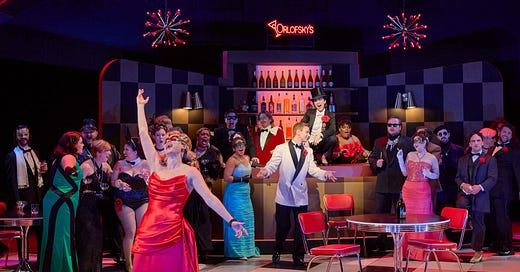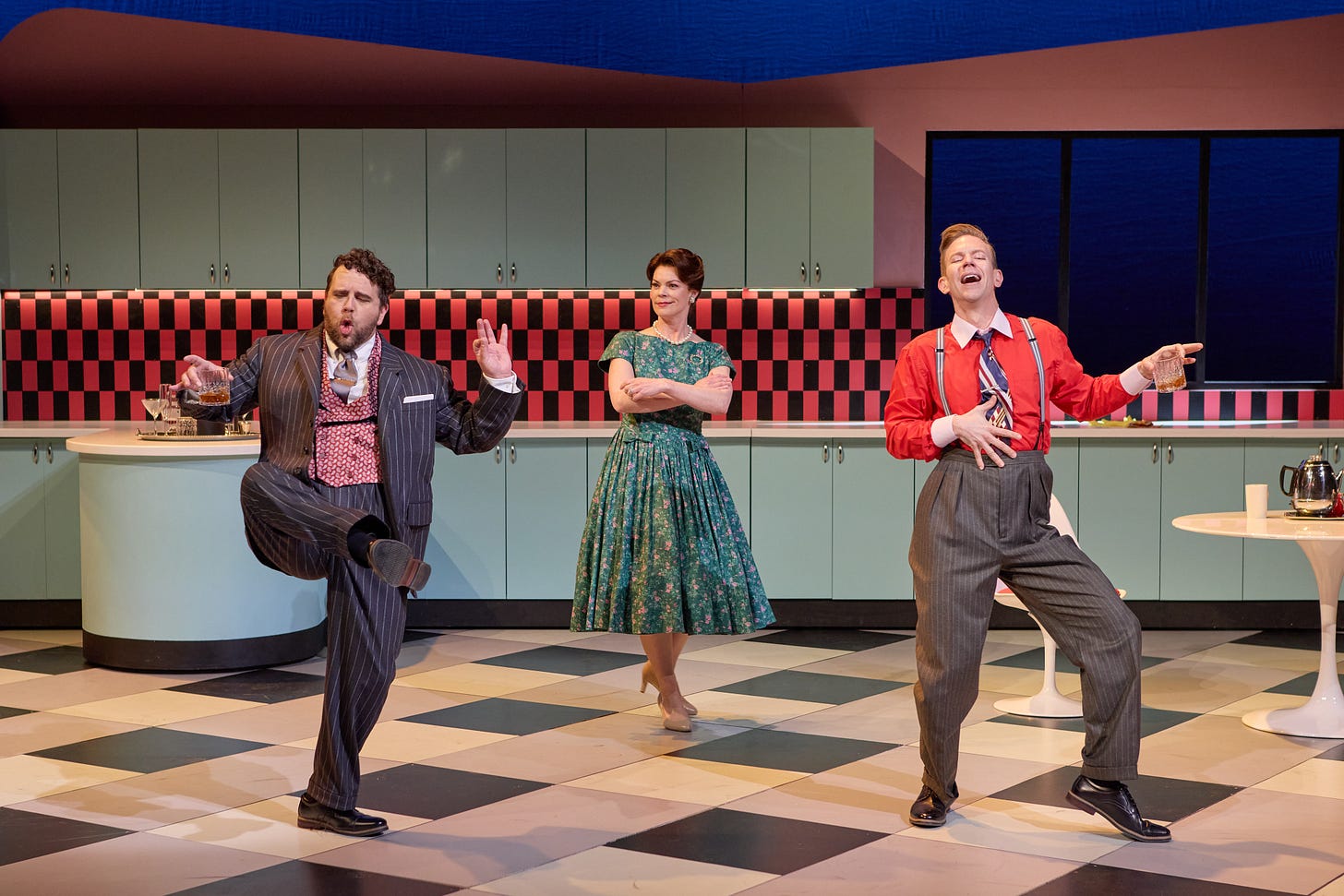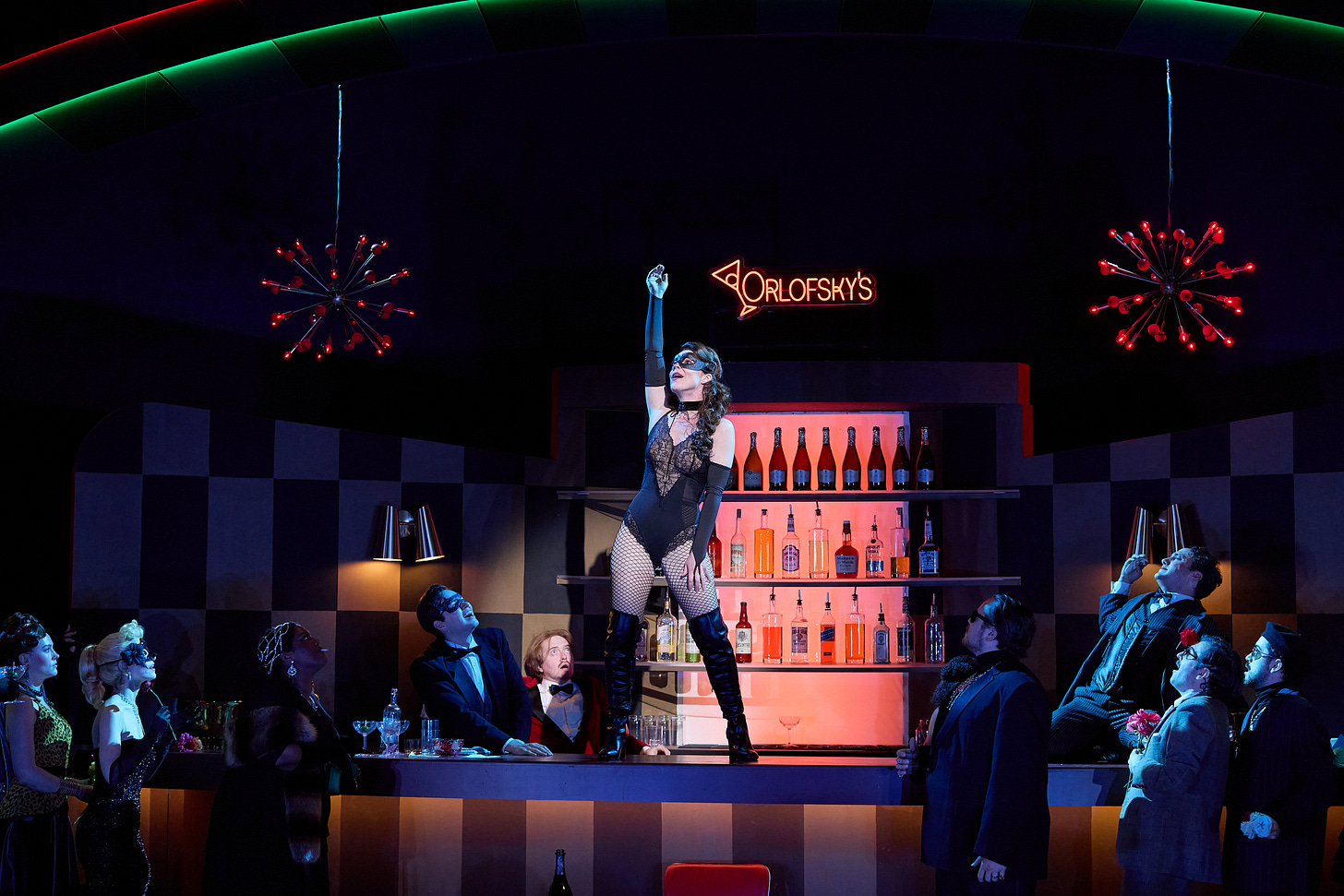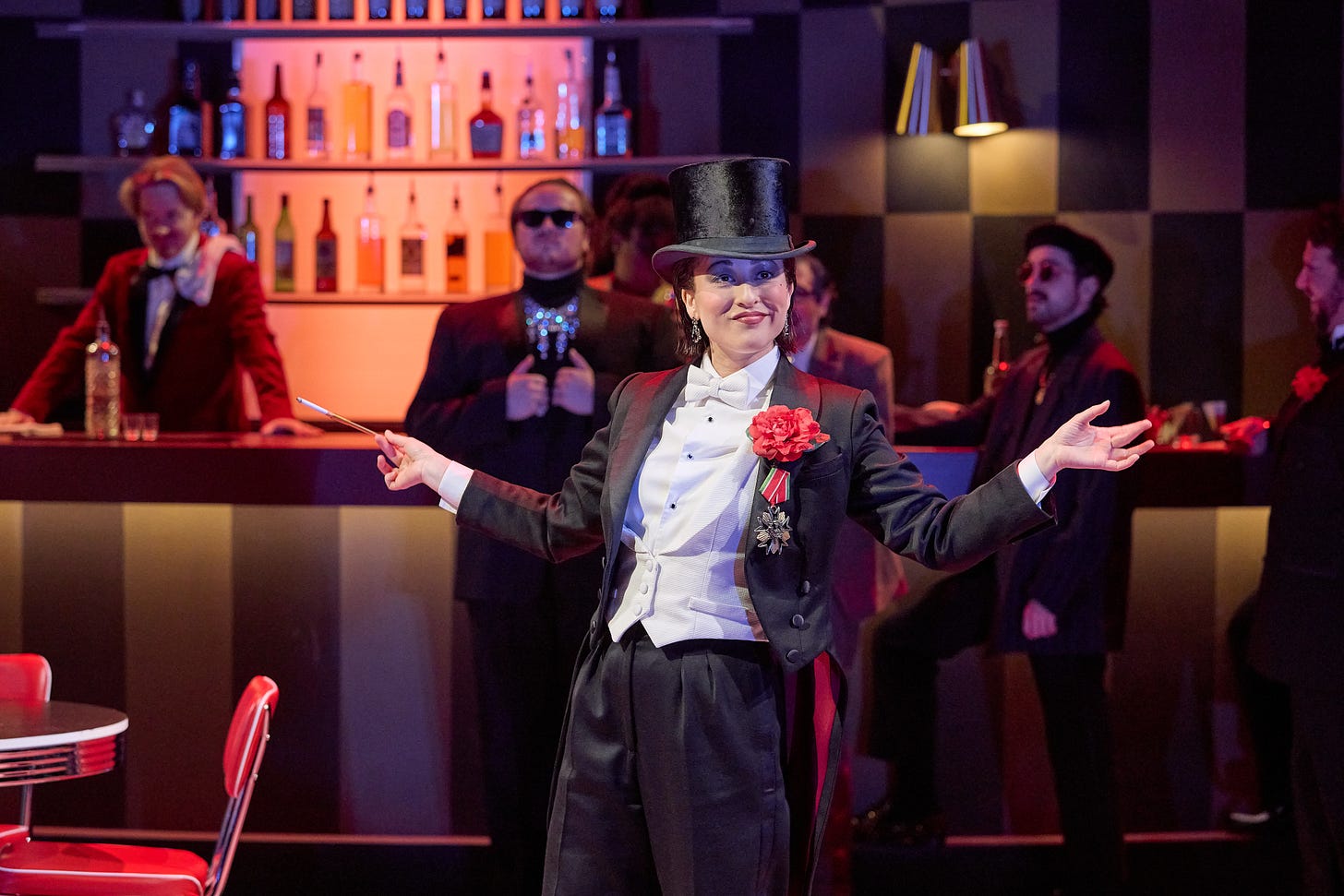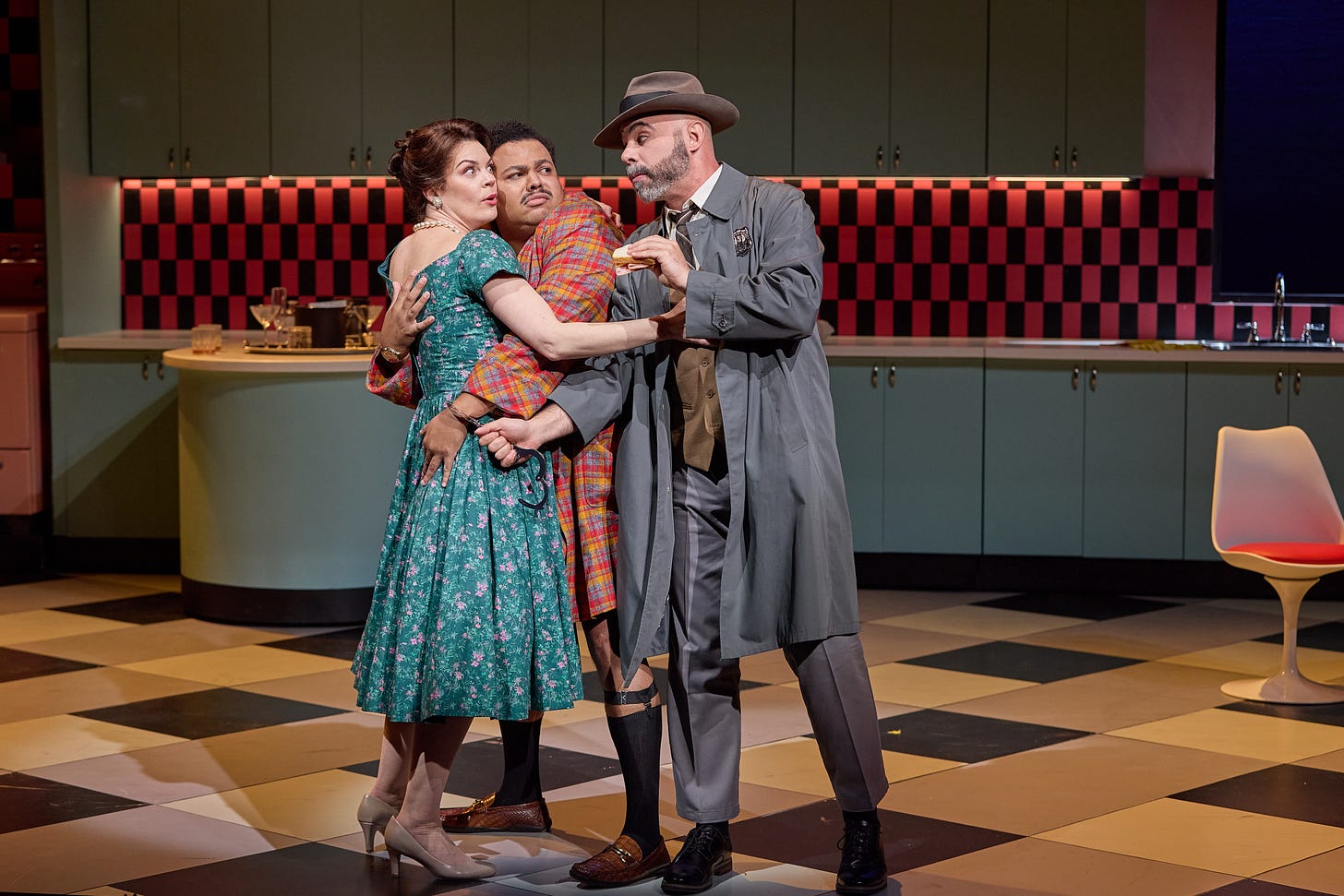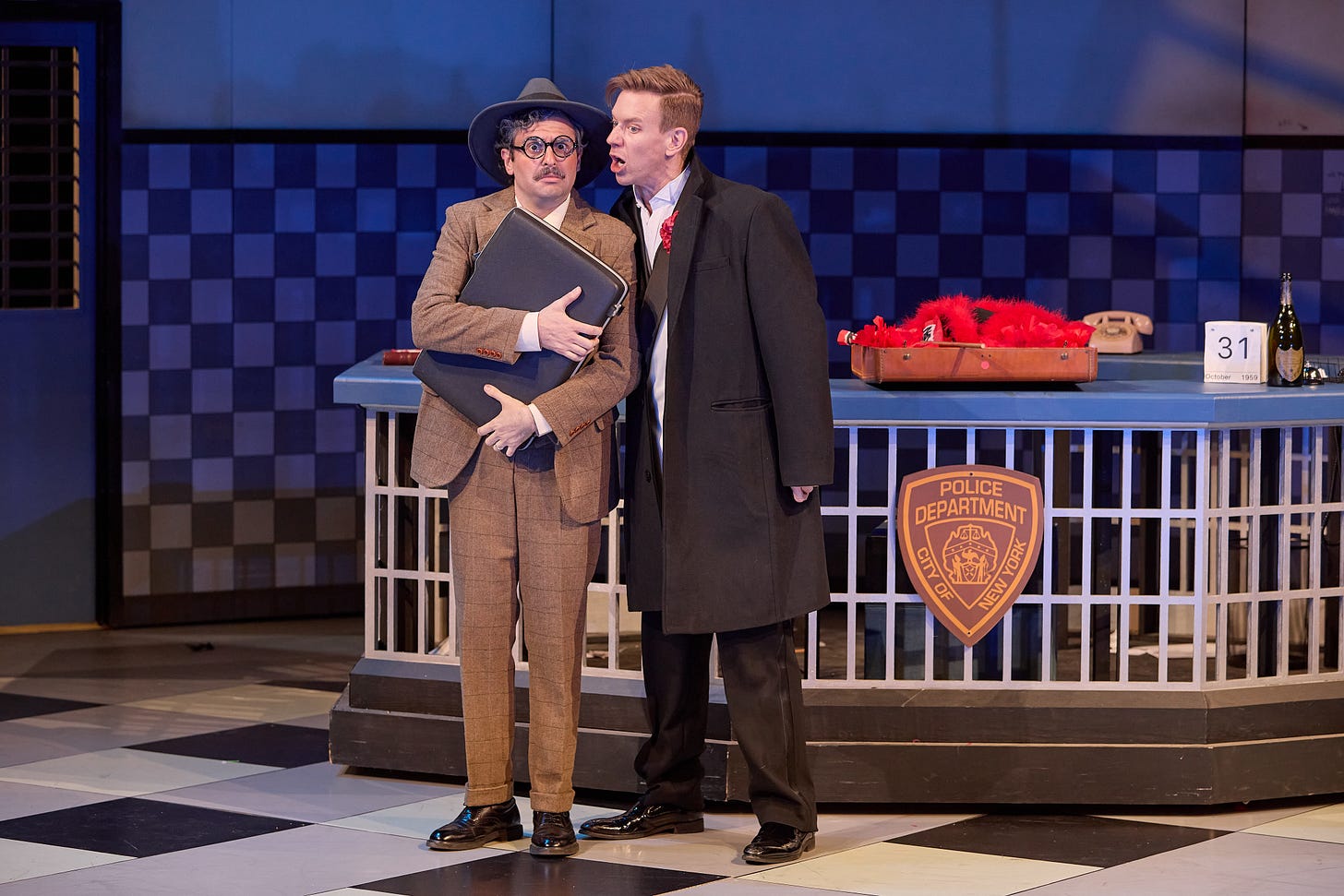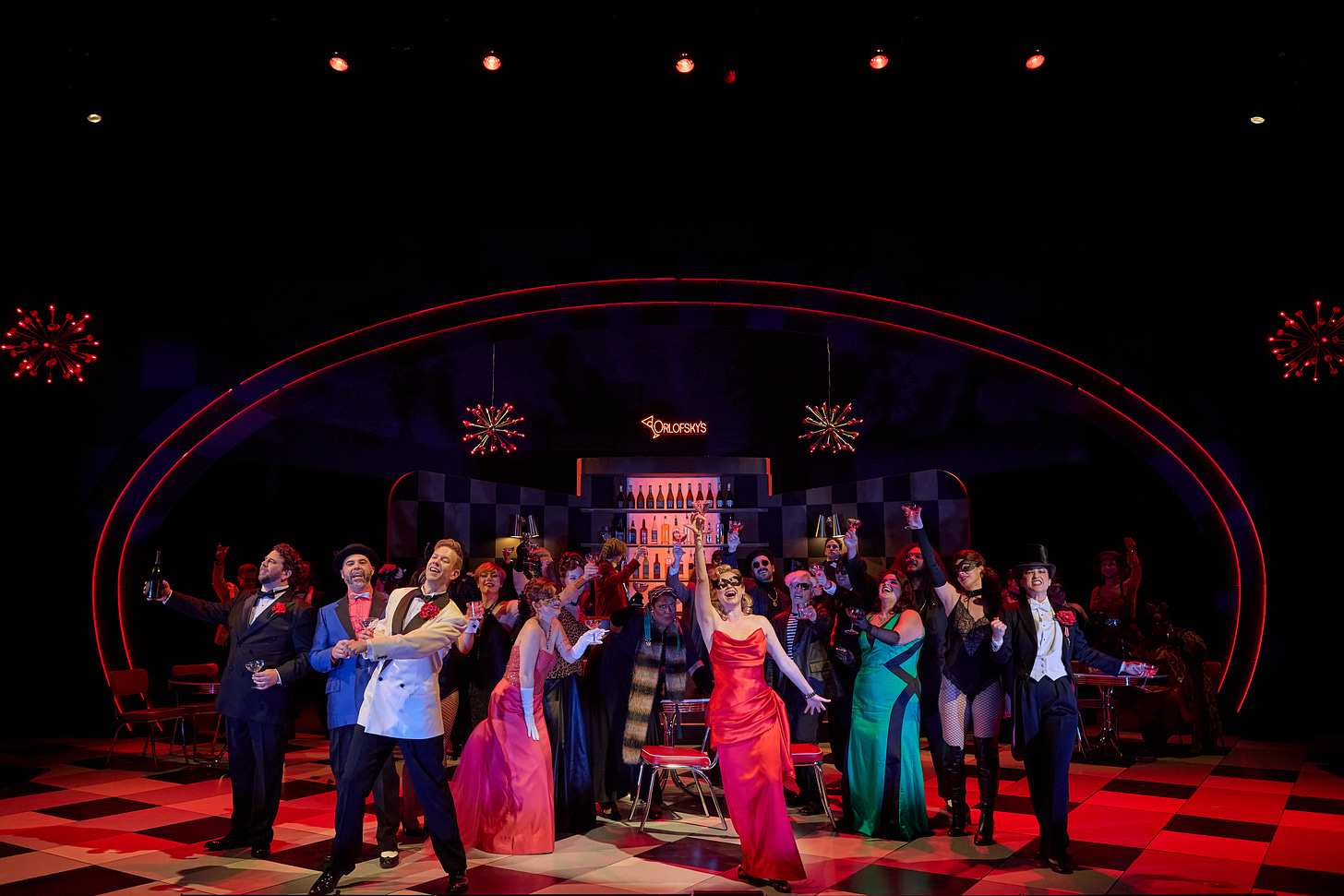Through June 28: A Frenetic "Fledermaus" Opens Opera Theatre's Season
Season 50 opens fast and furious
Opera Theatre of St. Louis (OTSL) has opened its 50th anniversary season with Johann Strauss the Second’s 1874 comic operetta Die Fledermaus. Previously presented by the company in 1983 as an off-season show at the late, lamented American Theatre and then as a touring production in 1989, Die Fledermaus is now getting its first regular season production. With its mix of both visual and verbal comedy and unabashed affirmation of champagne-fueled frivolity, the quintessential Viennese operetta should have been an ideal choice to kick off this celebratory season.
Unfortunately, director Shawna Lucey has elected to move the action from late 19th-century Vienna to New York City circa 1959 and to spike the champagne with a massive dose of Red Bull. The result is a frenetic barrage of sight gags, shouting, and general excess that renders most of the lyrics and spoken dialog incomprehensible and makes the projected English text indispensable. It also seems designed to draw as much attention away from the score as possible.
That starts with the overture, which winds up being background music for an elaborate and noisy sequence in which Eisenstein and his friend Dr. Falke, returning in a state of advanced inebriation from a costume party in superhero outfits, cause a bit of a scene on the subway. It ends with Falke, in his Batman costume, barfing into a woman’s purse before passing out and Eisenstein making a hasty exit. Falke gains the unwelcome nickname of “the Bat” and plots revenge.
Now, I have nothing against a good sight gag. I still think the early Three Stooges shorts with the original Curley are a hoot and I’m a sucker for a pre-1960s Warner Brothers cartoon. It’s just that when you turn up the schtick control to 11, it tends to drown out everything else. The opening night audience seemed to love it. I didn’t.
Anyway, flash forward a few years and Eisenstein, now a respectably boring advertising executive living in the ‘burbs with his wife Rosalinde, gets an invitation from Falke to join him at a costume party thrown by the notoriously Bohemian Prince Orlofsky at his Greenwich Village nightclub. Eisenstein jumps at the chance for a last fling before reporting to the city jail for an eight-day disorderly conduct sentence.
Unknown to Eisenstein, Falke plans to use the party as cover for a bit of revenge for the preshow incident on the subway. Unknown to both of them Rosalinde and her maid Adele, bored with suburban life, plan to be there as well. Everyone is disguised and mistaken identities abound, but it all ends happily with a rousing paean to champagne.
My complaints about the high level of audiovisual noise aside, this Fledermaus is exceptionally well sung, given the non-stop movement the director has given the singers. Soprano Deanna Breiwick scintillates as Adele, the chambermaid who dreams of an acting career and disguises herself as one in the Act II costume ball. Her flawless delivery of “My Lord Marquis” (a.k.a. “Adele’s Laughing Song”) and her Act III “Ever since I was a baby,” in which she touts her abilities as an actress, are reminders of why the New York Times once dubbed her a “vocal trapeze artist.”
Soprano Sara Gartland makes a striking OTSL debut as Rosalinde, still carrying a torch for her former lover and singing teacher Alfred (tenor Joshua Blue, in a fine comic cameo). Disguised as a Hungarian in Act II she delivers a striking and sinuous “Voice of my homeland” (a.k.a the "Czardas"). It’s staged as a striptease number here which, while appropriately lubricious, can be a bit distracting.
Mezzo Kelsey Lauritano is a wonderfully excessive Count Orlofsky, knocking back vodka shots and exquisitely bored by everything. One of the great operatic “pants” roles, Orlofsky is a comic license to kill, and Lauritano makes the most of it.
Baritone Edward Nelson, another Opera Theatre first-timer, brings a strong, flexible voice and fine comic sense to the role of Eisenstein. Baritone Jonathan McCullough romps through the role of Falke, vocally commanding and gleefully weaving his web of comic revenge. Baritone Robert Mellon, a familiar figure on local opera stages, proves once again that he is a dab hand at comedy as the befuddled Frank, who comes to arrest Eisenstein and winds up with a disguised Alfred instead.
Rounding out this fine cast are mezzo Sophia Baete as Adele’s sister Sally, tenor Gregory V. Sliskovich as Eisenstein’s inept lawyer Dr. Blind, and actor Oscar Olivo in the non-singing roles of Orlofsky’s valet Ivan and the inebriated jailer Frosch. Olivo is a gifted physical comic but has apparently been directed to deliver all his lines at maximum volume and speed. That makes his long Act III monolog about using disapproving grandmothers as a crime-fighting tool (a substitution for a much shorter bit in the original libretto) a fairly tedious business.
Conductor George Manahan conducts a lively rendition of the score. Seán Curran’s choreography was nicely tailored to the abilities of the performers. Sets and costumes by Robert Innes Hopkins were appropriately cartoonish, including an Act I kitchen that looks like The Jetsons viewed through a migraine aura and a Las Vegas–cheesy Act II nightclub.
Ultimately, my real issue with this Fledermaus is not so much the concept itself as the execution (I use the word advisedly) of that concept. The parallels between fin de siècle Vienna and 1950s New York are shaky but properly done this could have been fun—which it apparently was for most of the opening night audience. For me, though, it came across as a loud, incoherent assault. If you like your comedy “fast and furious” you might appreciate this Fledermaus. Personally, I plan to go back and watch the rest of the Vienna State Opera version on YouTube.
Die Fledermaus runs through June 28th in rotating repertory with the other three operas on the Browning Mainstage at the Loretto-Hilton Center on the Webster University campus. Visit the OTSL web site for details.

